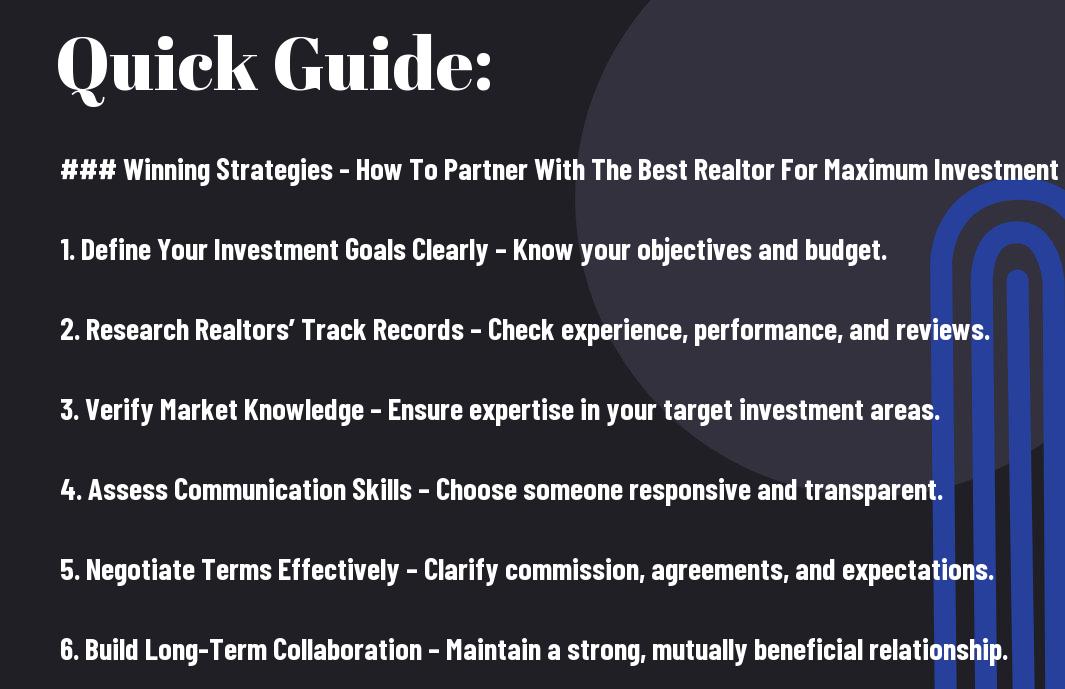Realtor expertise can significantly influence your investment outcomes. By strategically selecting the right realtor, you can leverage their market insight and negotiation skills to maximize your returns. This guide will walk you through effective strategies to identify and partner with top realtors, ensuring you make informed decisions that align with your investment goals. You’ll discover how to assess potential partners, the importance of communication, and ways to establish a relationship that drives success in your real estate ventures.

Understanding Types of Realtors
The real estate landscape is populated by various types of realtors, each with distinct roles and expertise. Understanding these differences can aid you in selecting the right partner, ensuring you maximize your investment returns. Here are key categories to consider:
- Residential Realtors
- Commercial Realtors
- Investment Specialists
- Tenant Representatives
- Listing Agents
Assume that you are clear on the distinctions among these roles, as they cater to different aspects of real estate and can significantly impact your investment strategy.
| Type of Realtor | Description |
|---|---|
| Residential Realtor | Focuses on buying and selling homes and apartments. |
| Commercial Realtor | Specializes in commercial properties like retail and office buildings. |
| Investment Specialist | Provides advice on investment properties and ROI. |
| Tenant Representative | Helps tenants find suitable rental spaces. |
| Listing Agent | Assists sellers in listing and marketing their properties. |
Types of Real Estate Agents
An understanding of real estate agents is pivotal to your investment success. Agents can generally be categorized based on their function, bringing unique perspectives and skills to the table. Here’s a breakdown:
- Buyer’s Agent
- Seller’s Agent
- Dual Agent
- Broker vs. Agent
- Real Estate Assistant
Thou should consider these various types to ensure you select a realtor who aligns with your specific goals and investment strategy.
| Type of Agent | Description |
|---|---|
| Buyer’s Agent | Works exclusively for the buyer in transactions. |
| Seller’s Agent | Represents the seller and handles property marketing. |
| Dual Agent | Represents both buyer and seller in the same transaction. |
| Broker | Licensed to manage a real estate office and can own a business. |
| Real Estate Assistant | Supports agents in administrative tasks, but usually not licensed. |
Specializations and Expertise
Little do many know, realtors can also have specific specializations that cater to niche markets or areas of expertise. This can be a significant factor in your selection process. Different specializations can greatly influence the effectiveness of your partnership. For example, a realtor who specializes in luxury real estate might be better equipped to handle high-value investments.
Types of specializations you might encounter include property management, senior real estate, short sales, and foreclosures. Each of these areas requires a deep understanding of the market to provide the best guidance possible. Hence, knowing what specific skills or experiences your realtor has can fine-tune your investment strategies.
Key Factors in Choosing a Realtor
While selecting the right realtor for your investment needs, several key factors can make a significant difference in your overall experience and outcome. You want to partner with a real estate professional who aligns with your goals and possesses the necessary skills to help you succeed. Consider the following elements when making your decision:
- Experience in investment properties
- Strong negotiation skills
- Positive client testimonials and reviews
- Effective communication and interpersonal skills
- Local market expertise
Recognizing these factors will help you select a realtor who not only understands the intricacies of real estate transactions but can also advocate for your interests and maximize your returns.
Experience and Track Record
One of the first things you should examine when considering a realtor is their experience and track record in your target market. A realtor who has successfully navigated various investment transactions will have valuable insights and strategies that can benefit you. Look for a professional with a proven history of closing deals that align with your investment objectives, whether you’re focused on rental properties, fix-and-flips, or commercial real estate.
In addition to years of service, evaluate their performance metrics, such as the average time properties spend on the market and the percentage of deals that close at or above the asking price. This information can provide you with a clearer picture of how effectively they represent clients in a competitive marketplace.
Local Market Knowledge
Knowledge of the local market is another necessary factor to consider when choosing a realtor. Your ideal partner should have a comprehensive understanding of the neighborhoods you are interested in, including current property values, trends, and upcoming developments. They can provide insights into which areas offer the best opportunities for appreciation, as well as the rental demand in various locations.
This local expertise will empower you to make informed decisions regarding where to invest your money. A realtor who is well-versed in local trends can also alert you to potential pitfalls, helping you avoid properties that may seem appealing but are unlikely to yield substantial returns. When you engage with a realtor who genuinely understands the nuances of the local market, you’ll position yourself for better investment outcomes.
Pros and Cons of Partnering with a Realtor
All partnerships come with their own set of advantages and disadvantages, and working alongside a realtor is no exception. It’s important for you to weigh these pros and cons before making a decision that could significantly impact your investment returns. Below, we’ve outlined the key points to consider in the form of a table:
| Pros | Cons |
|---|---|
| Expert market knowledge | Potentially high commissions |
| Access to exclusive listings | May prioritize their own interests |
| Negotiation expertise | Less control over the buying process |
| Comprehensive marketing strategies | Dependence on realtor’s availability |
| Network of professionals (inspectors, lenders) | Possibility of misalignment in goals |
Benefits of Working with a Realtor
Realtor partnerships can significantly enhance your investment experience. The professional insight they provide into market trends, property values, and local neighborhoods can be invaluable for making well-informed decisions. You gain access to a wealth of knowledge that would take years for you to accumulate independently. Moreover, realtors often have access to exclusive listings not available to the general public, giving you an edge in finding lucrative opportunities before they become competitive.
Another major benefit is their skill set in negotiation. Effective realtors are trained negotiators who understand how to get the best price for you, whether you’re buying or selling. Their marketing strategies can attract a wider audience, ensuring your property stands out in a crowded market. Additionally, they have established relations with other professionals in the real estate domain, such as inspectors and lenders, simplifying your process and making it more seamless.
Potential Drawbacks
Potential drawbacks exist when partnering with a realtor, and it’s vital for you to understand them. For one, the cost associated with enlisting a realtor can be substantial; commissions typically fall between 5-6% of the final sale price. This could reduce your overall investment returns. Another concern is that some realtors may not fully align with your objectives, potentially prioritizing their own financial incentives over your best interests.
For instance, you might find that some realtors are more focused on closing a deal quickly to earn their commission rather than ensuring that the investment is maximized for you. This misalignment can lead to less than optimal choices that could affect your long-term returns. Moreover, working with a realtor sometimes means relinquishing some control over the buying or selling process, which can be unsettling for those who prefer to manage transactions directly. Always ensure you have clear communication and that your goals align to mitigate these risks.
Tips for Effective Communication
Unlike some traditional business relationships, partnering with a realtor requires you to engage in open and effective communication. Clear communication not only fosters a healthy working relationship but also enhances your understanding of market trends, strategies, and potential investment opportunities. Here are a few tips to improve your communication with your realtor:
- Be clear about your investment goals and financial capabilities.
- Share your preferred communication method and availability.
- Ask questions to clarify doubts during discussions.
- Provide feedback on listings or strategies proposed by the realtor.
- Maintain a professional yet approachable demeanor.
Any enhancing of your communication skills with your realtor will pave the way for a more fruitful partnership. Through clear dialogue, you will both be on the same page, allowing you to make informed decisions that lead to better investment outcomes.
Setting Expectations
Tips for setting expectations include discussing your investment timeline and what you hope to achieve at each phase of the process. Clearly communicate any specific criteria you have regarding property types, location, and other important features. Being upfront about your budget will also help your realtor to tailor their property suggestions, ensuring you explore the most suitable options.
Effective expectation-setting also involves discussing your level of involvement in the home-buying process. Let your realtor know whether you prefer to be hands-on or prefer them to handle most of the interactions. Openly addressing expectations in the beginning will set a strong foundation for your working relationship.
Maintaining Open Dialogue
Maintaining open dialogue with your realtor is necessary for a successful partnership. Regular check-ins, whether through calls, emails, or in-person meetings, will ensure that you are both aligned on priorities and updates. Encourage a two-way communication approach where your realtor feels comfortable bringing ideas and suggestions to the table while you remain engaged in the process.
To ensure the communication remains fluid, make it a habit to touch base with your realtor regularly, even when things seem to be going smoothly. Asking for updates, discussing changing market conditions, or simply expressing any new thoughts you may have on your investment can make a meaningful difference. This consistent dialogue not only keeps you informed but also demonstrates to your realtor that you value their expertise and insights, fostering a collaborative environment conducive to achieving your investment goals.
Step-by-Step Guide to Hiring the Right Realtor
Keep these strategies in mind when choosing a realtor who aligns with your investment goals.
| Steps | Details |
|---|---|
| Research and Shortlisting | Look for realtors with demonstrated experience in investment properties within your target market. |
| Interviewing Candidates | Engage the top candidates to understand their market knowledge and investment strategies. |
Research and Shortlisting
Any successful partnership begins with diligent research. You should leverage online resources, such as local realtor directories and industry websites, to identify potential candidates. Pay attention to their track record, focusing on agents who have sold investment properties similar to what you’re looking for. You might also seek recommendations from friends, family, or colleagues who have experience in real estate investing. This will help you create a shortlist of realtors who not only possess the necessary experience but also have a solid reputation in your chosen market.
Interviewing Candidates
Research their credentials and prepare a set of targeted questions before meeting with your shortlisted realtors. This will help you gauge their level of expertise, local knowledge, and understanding of investment strategies. Ask about their previous deals, negotiation successes, and how they utilize market data to inform their decisions. Their responses will provide insight into whether they will be a proactive partner in maximizing your returns.
A thorough interview process will expose the candidate’s communication style and how well they can articulate their strategies for your specific investment goals. Consider their ability to engage in meaningful dialogue as an indicator of their investment acumen. You want someone who will not only listen to your needs but also offer you informed advice that aligns with your objectives.
Maximizing Investment Returns with a Realtor
Once again, partnering with a skilled realtor can significantly enhance your investment returns. A realtor who understands your market and investment goals can provide invaluable insights, guiding you to properties that meet your criteria for potential appreciation and cash flow. They can help you navigate the complexities of the real estate landscape, ensuring you make informed decisions that align with your investment strategy. By leveraging their expertise, you position yourself to capitalize on opportunities that may otherwise go unnoticed, ultimately maximizing your returns on investment.
Strategies for Success
On your journey to maximize investment returns, it’s important to implement effective strategies alongside your realtor. Start by clearly defining your investment goals—whether you’re seeking immediate cash flow or long-term appreciation. Your realtor will be better equipped to find properties aligned with these goals if you communicate them effectively. Additionally, consider building a strong network, as your realtor can often introduce you to other professionals—such as lenders, contractors, and property managers—who can further enhance your investment strategies and increase your overall profitability.
Measuring Outcomes
Some key measurements will help you evaluate the effectiveness of your partnership with a realtor and your investment strategies. Keep track of the return on investment (ROI) your properties generate, alongside other metrics like occupancy rates, rental income, and property appreciation. Regularly assessing these outcomes allows you to analyze trends and make necessary adjustments. If a particular approach isn’t yielding the results you anticipated, you can pivot your strategy, whether that involves reassessing your property selections, investment goals, or even your partnership with your realtor.
Strategies to measure outcomes should be comprehensive and include the use of actionable data analytics. By employing tools that provide insights into market trends, pricing fluctuations, and other relevant factors, you can assess your investment performance effectively. This empirical approach allows you to refine future strategies, ensuring your realtor’s expertise aligns with your financial goals to achieve the best possible investments.
Final Words
Presently, partnering with the right realtor can significantly influence your investment success. You should seek out agents who not only have a strong grasp of the local market but also demonstrate an understanding of your specific investment goals. Whether you’re looking for properties to rent, flip, or hold long-term, collaborating with a realtor who aligns with your strategy will provide you with invaluable insights. Engaging in open communication about what you want and expect from the partnership further solidifies this relationship, enabling the realtor to help you navigate challenges and seize opportunities effectively.
Lastly, your choice of realtor acts as the foundation for maximizing investment returns. Evaluate potential partners by assessing their track record, expertise in your target market, and willingness to work collaboratively. By investing time in finding the right realtor, you position yourself not just for immediate gains but for sustained growth in your investment portfolio. An effective partnership can lead to valuable advice, better deals, and an overall more rewarding investment experience, ensuring your financial objectives are met and surpassed.



